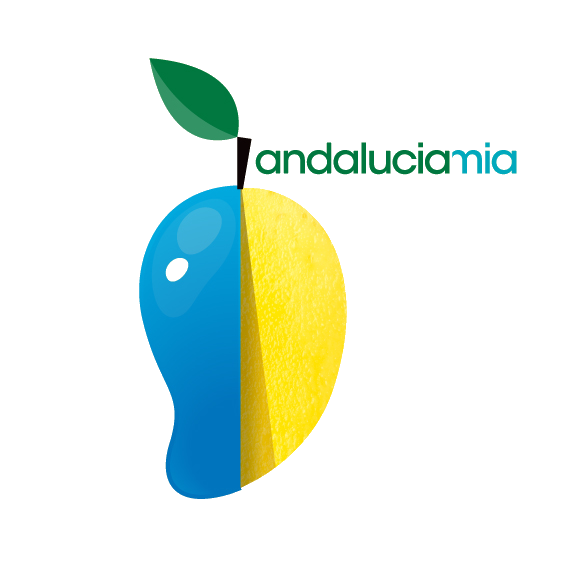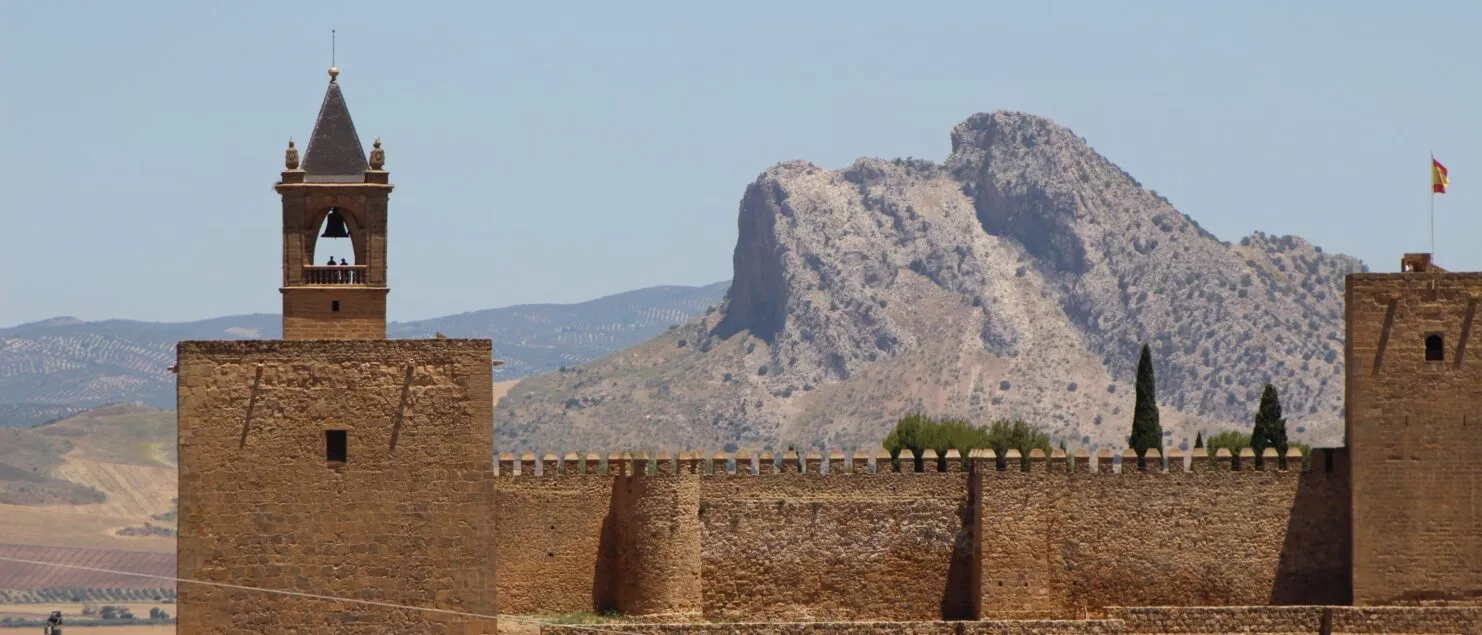What to see in Antequera – discover 20 must-see places
A visit to Antequera offers travellers a wealth of places to see
In this article you will find the essential information about what to see in Antequera :
- A few words about Antequera and Andalucia
- Antequera’s World Heritage Sites
- The origins of Antequera
- What to see in Antequera
- What to do in Antequera and its surroundings?
- Private guided tour of Antequera with an English-speaking guide
- The Fiesta de la Primavera in Antequera
- Where to stay in Antequera?
- Locate Antequera on the map of Andalusia
- What to see around Antequera?
- Some useful links (car hire, other ideas for visits)
A few words about Antequera and Andalucia
Antequera will take you to the geographical centre of Andalucia. It is located at the crossroads of the cities of Malaga, Granada, Cordoba and Seville.
In addition, since 2017, the 0 kilometre point of the roads of Andalucia has been set right next to the church of San Sebastian, at the level of this sculpture below.
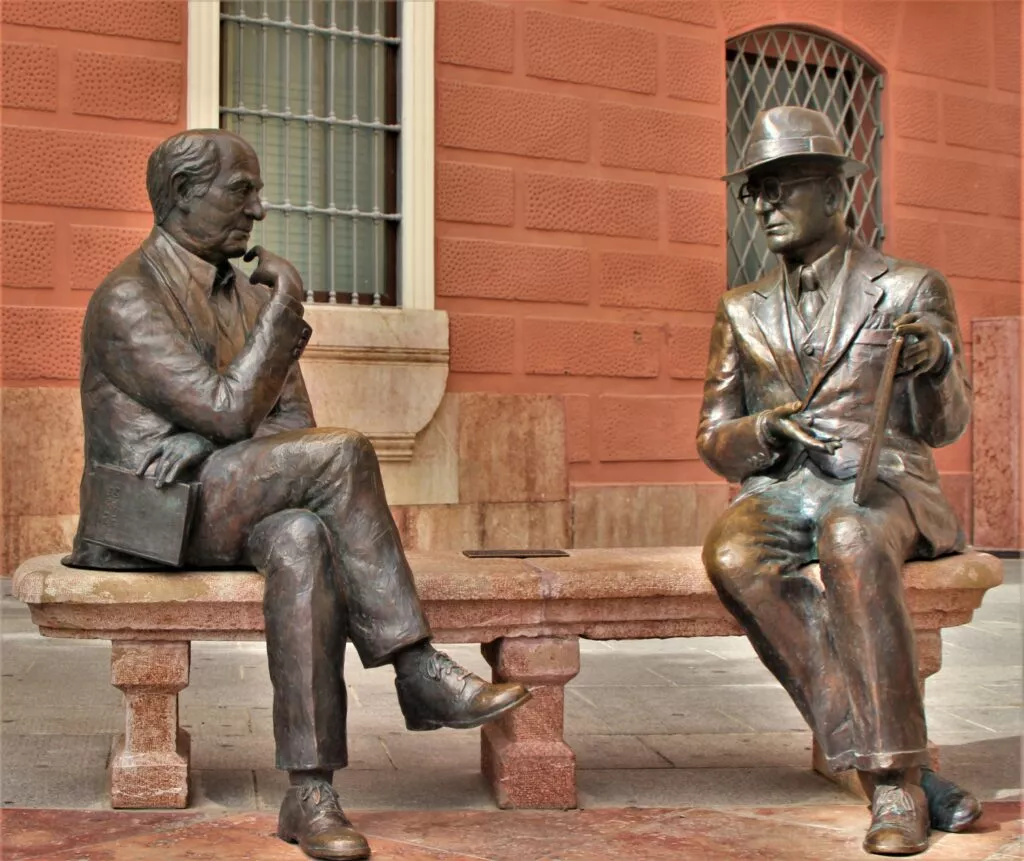
Antequera, which has preserved traces of the Roman and Al-Andalus eras, has many monuments to discover. Most of them are palaces and churches. It has been nicknamed “the convent city” with its 33 churchs.
Antequera’s World Heritage Sites
In the municipality of Antequera, UNESCO declared 2 natural sites and 3 prehistoric dolmens as World Heritage Sites in 2016!
- Peña de los Enamorados mountain
- The incredible karst site known as El Tocal
- Dolmen of Menga
- Dolmen of Viera
- And the Dolmen of Tholos
The city has a unique historical, cultural and natural heritage.
Origins of Antequera are interesting to know before seeing Antequera
It is known today that several peoples settled on this site: the Iberians, the Tartessos, the Phoenicians and the Carthaginians.
However, the foundations of Antequera date back some 2000 years, to the Roman era. The village was then called Antikaria.
In 726, Antikaria became part of al-Andalus and was called Medina Antaqira.
In 1410, the city was conquered by the Catholic kings, and later took the name we know today: Antequera
What to see in Antequera?
- The Real Colegiata de Santa María la Mayor
- The Alcazaba
- Real Colegiata de San Sebastián Church
- Convent of Madre de Dios de Monteagudo
- Church of San Pedro (16th century)
- Royal Monastery of San Zoilo
- The Portichuelo district
- Santo Domingo Church
- The statue of los enamorados
- Nájera Palace
- Plaza de toros
- Arco de los Gigantes (Arch of the Giants)
- Church of Los Remedios and its legend
- The Roman Baths of Santa Maria
- Palacio de Los Marqueses de la Peña de los Enamorados
- Other churches and palaces
- The dolmens
- The Peña de los Enamorados
- The Fuente de Piedra lagoon
- El Torcal Park
At the bottom of the page, if you are interested, you will find a link to a English-speaking guide based in Antequera who offers guided tours of the town, the Torcal and the dolmens.
Real Colegiata de Santa María la Mayor
This magnificent church dates from the early 16th century. It is classified as a national monument of Gothic and Renaissance style. It is considered the first Renaissance building in Andalusia.
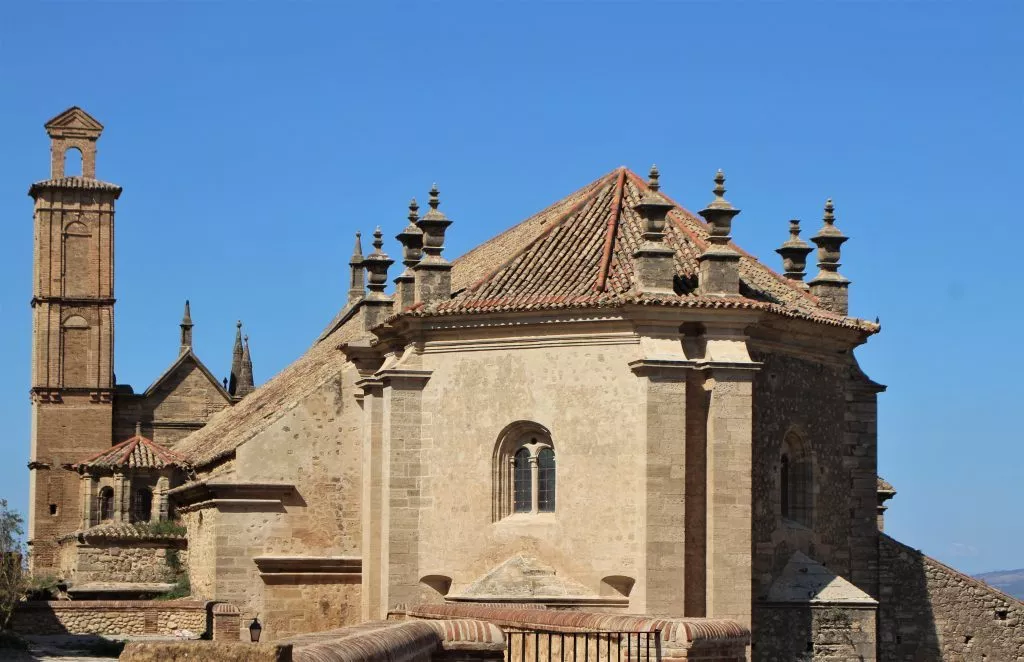
A humanist university was founded here. It became the meeting place for many writers and intellectuals of the Spanish Renaissance.
Below, the statue of the scholar Pedro Espinosa (1578-1650) in the Plaza de Escribanos in front of the church
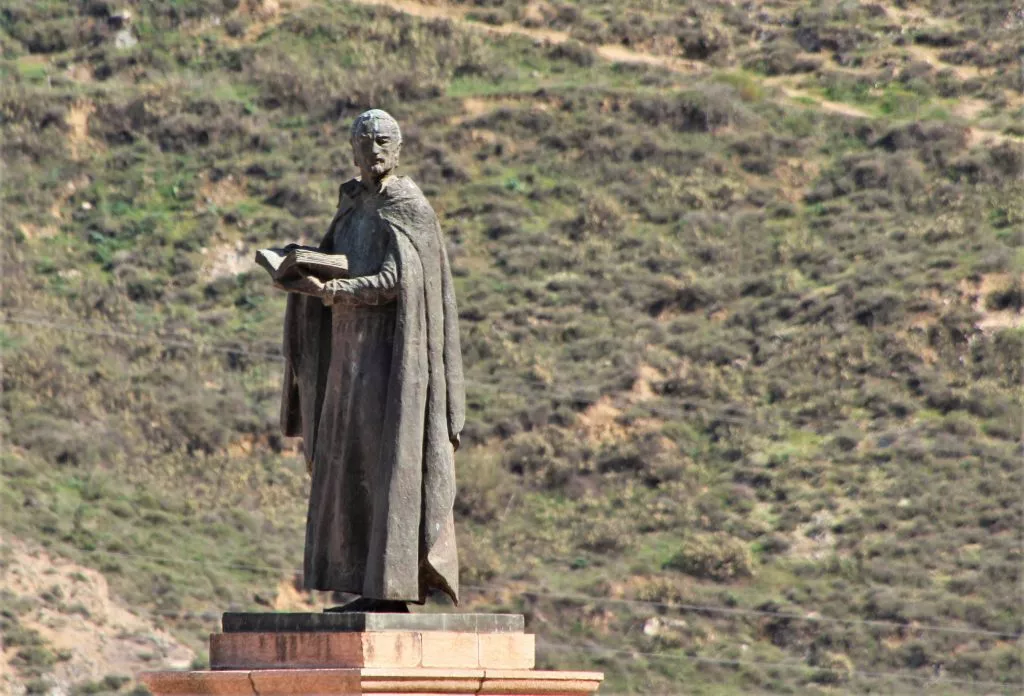
This church in Antequera is finally located between the ancient Roman baths of Antikaria and the ancient Kasbah of Medina Antaqira. The site finally offers a view of 2000 years of the city’s history!
As for the ancient kasbah of Antequera, it bears the Spanish name of alcazaba, as do the other towns. The origin of the word comes from the Arabic Al Casbah which means citadel or fortress.
See the photos below of these 2 sites.
The Alcazaba a must-see in Antequera
This is one of the best place to visit in Antequera.
If a small castle existed since the 11th century, the Alcazaba was built during the 14th century, under the Nasrid reign (kingdom of Granada). The walls were built at that time to protect against the advance of the Christian troops.
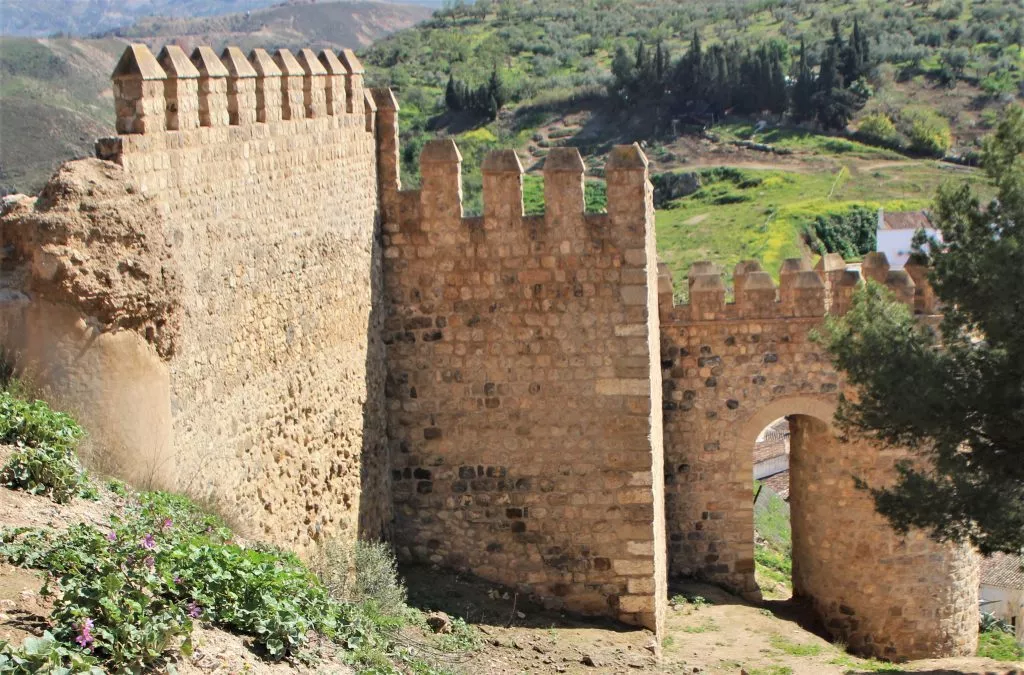
This alcazaba had a large size. More than 2600 people could live there.
Today we can visit this fortress, with its 2 defensive towers. The first one, the Torre del Homenaje, offers a breathtaking view of the city and the Peña de los Enamorados. It is also the largest tower of the Moorish period, after the Tower of Calahorra in Gibraltar.
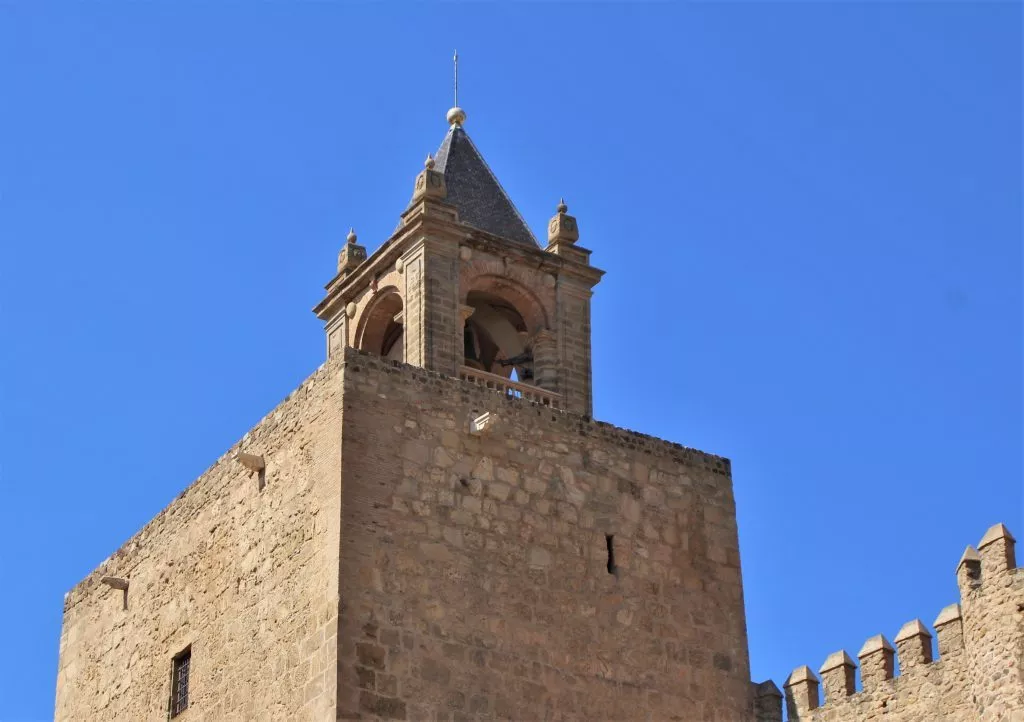
An amusing anecdote that highlights the Andalusian humour: On the Torre del Homenaje (above), of Moorish construction, a bell tower was later installed during the Renaissance, bearing the name Torre del Reloj (Clock Tower). In order to finance its construction, the city was forced to sell a cork oak forest. This was enough for the inhabitants to nickname the tower the Torre de Papabellotas… (oakacornsFather Tower).
The second tower of the Alcazaba is the Torre Blanca :
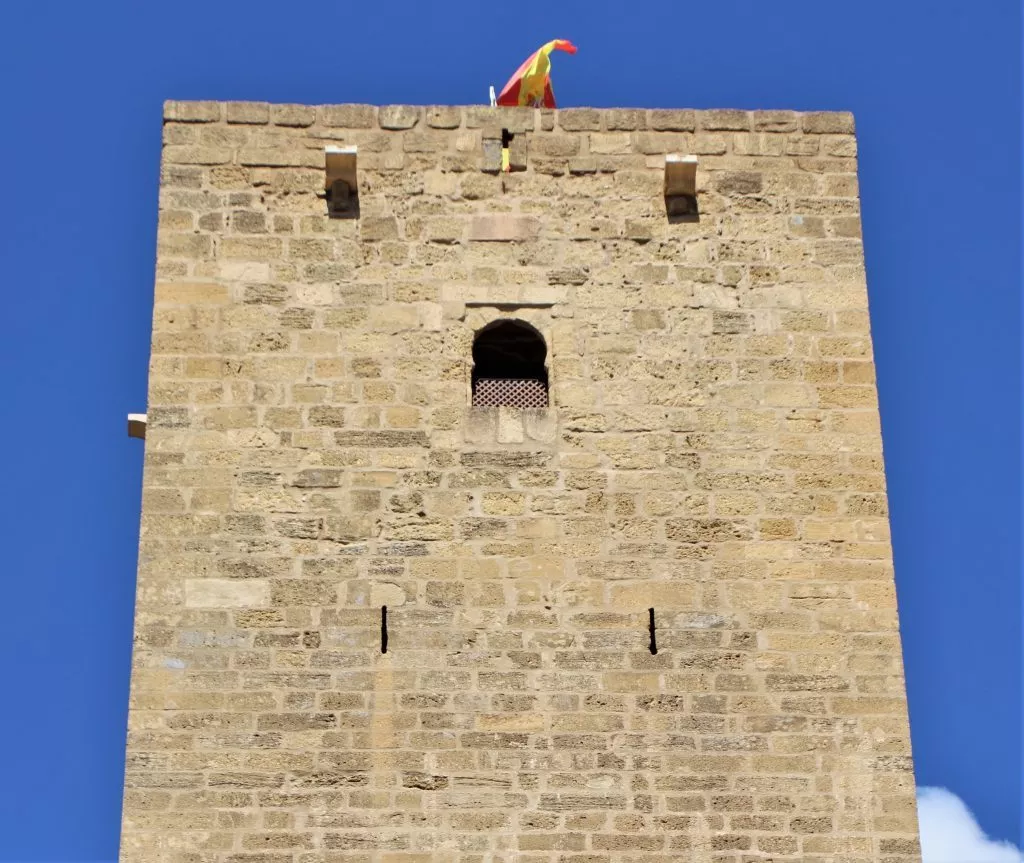
Real Colegiata de San Sebastián Church
It was built in 1548. It has undergone many changes since then, and today you can admire this mixture of architectural styles.
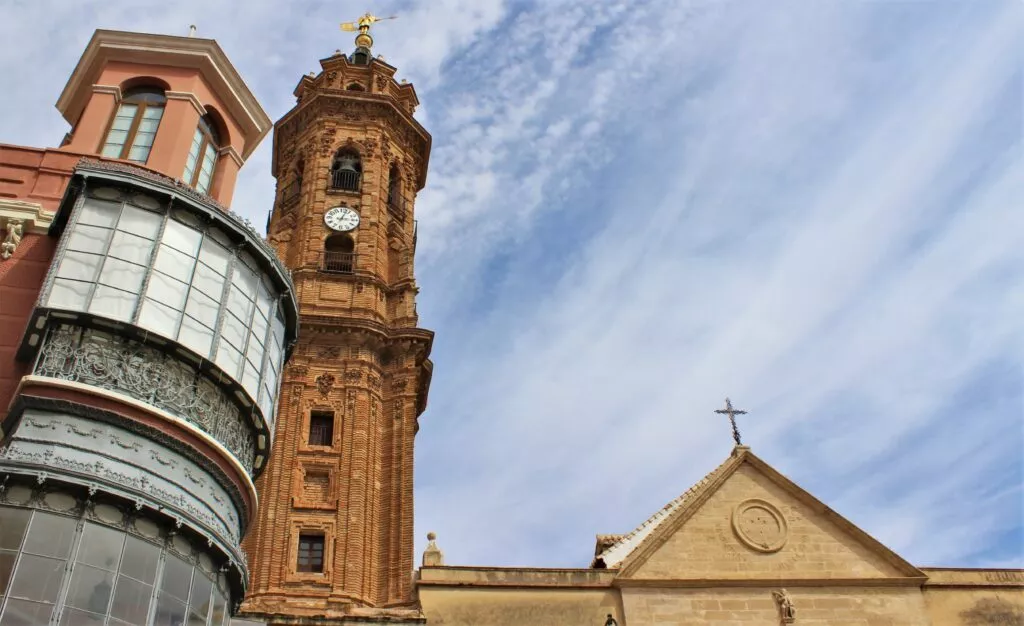
Its bell tower is quite spectacular.
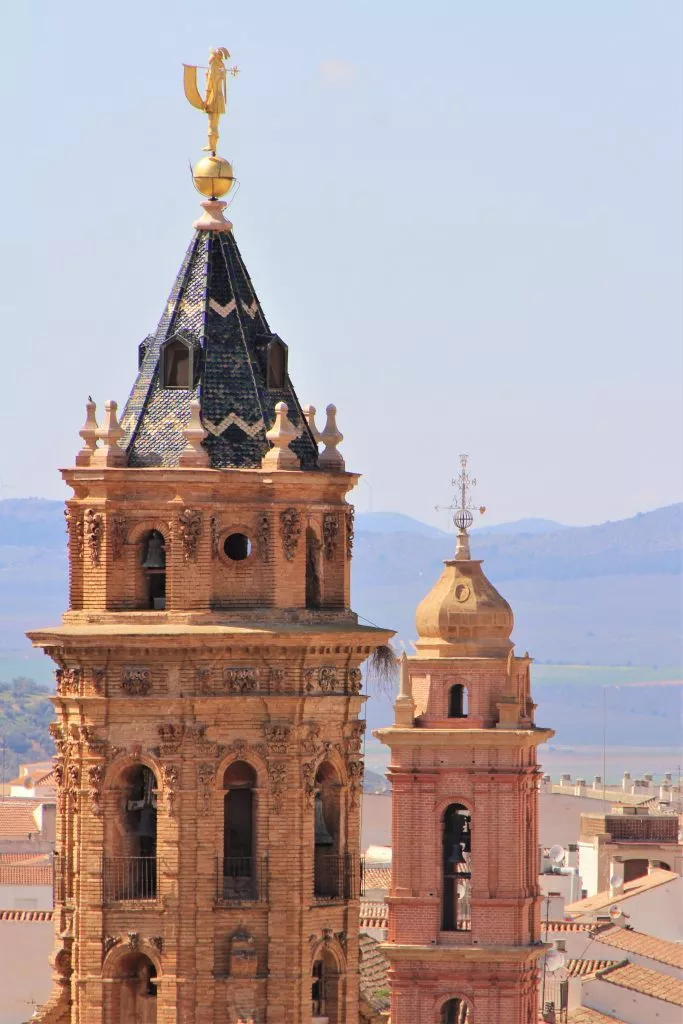
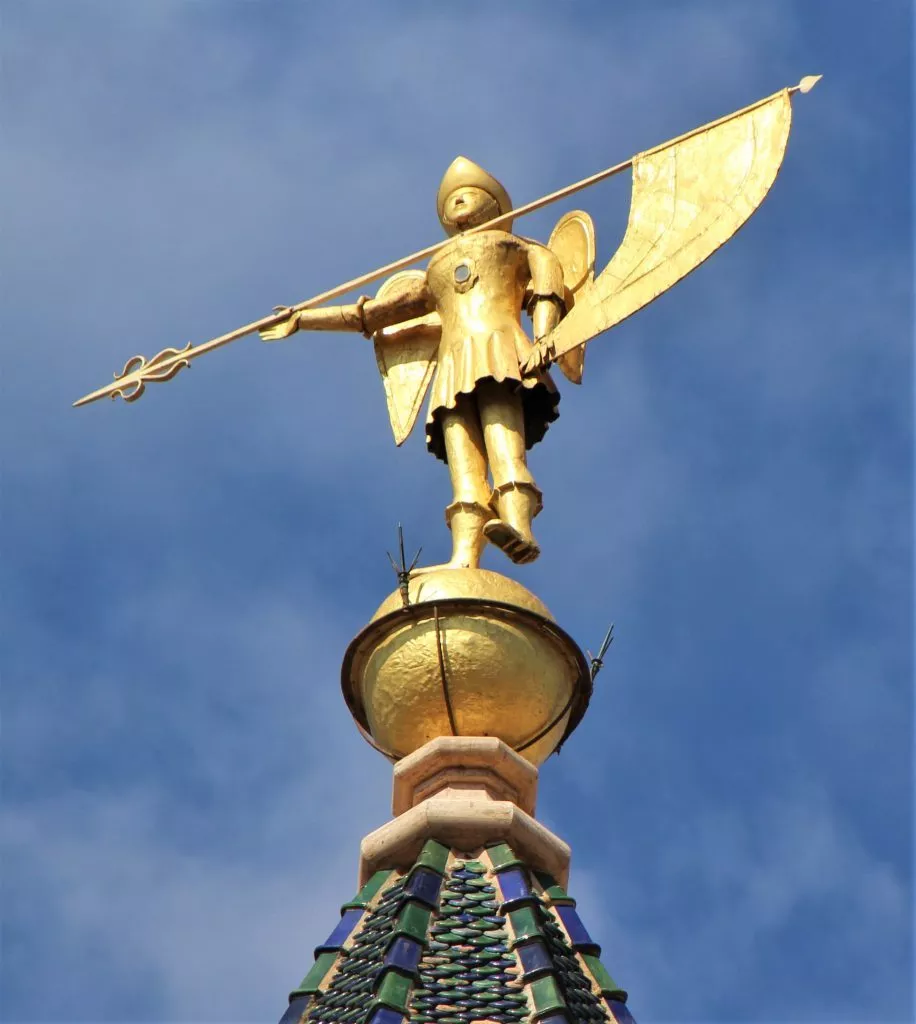
Madre de Dios de Monteagudo Convent
It is best known for its baroque bell tower. Below is a photo of its pediment.
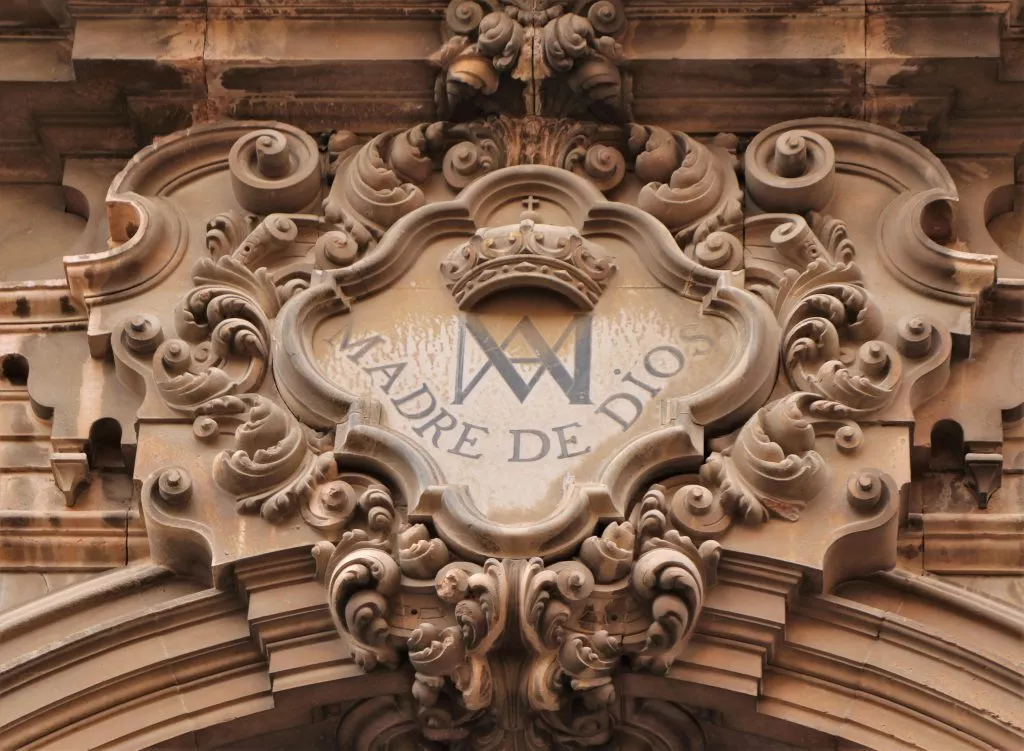
San Pedro Church (XVIe century),
Its foundations are very old. Traces of an ancient Visigothic building have been found.
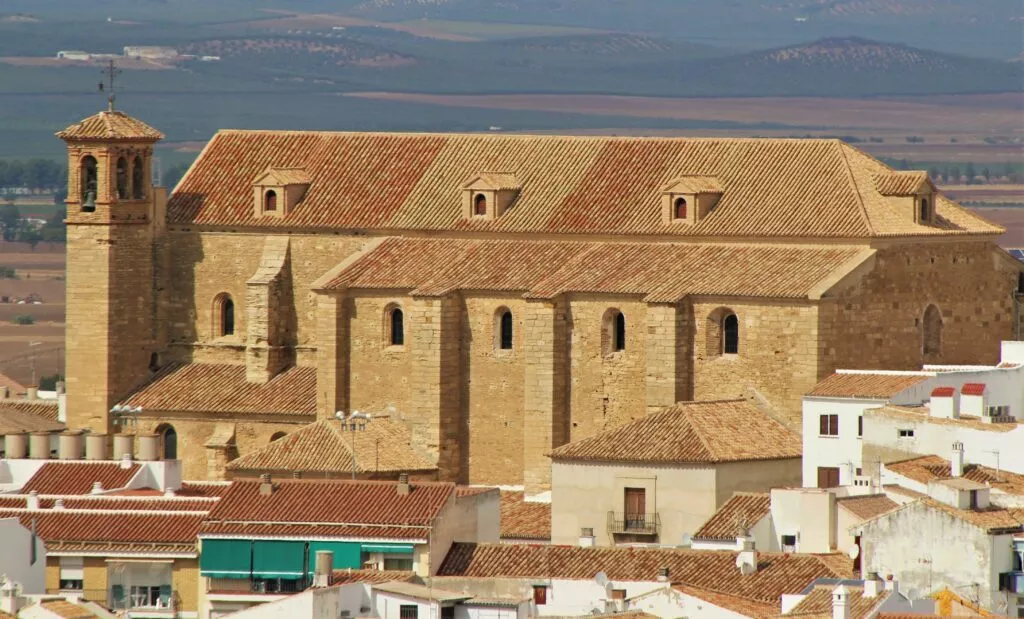
Royal Monastery of San Zoilo,
It was founded in 1500. It is a national monument in Gothic style.
A monastery with valuable works of art.
The Portichuelo neighbourhood
Portichuelo is the most picturesque neighbourhood in Antequera and is located on the upper part of the city, very close to the Alcazaba.
In a square in this neighbourhood there is a beautiful chapel. It is the Chapel of the Virgen del Socorro.
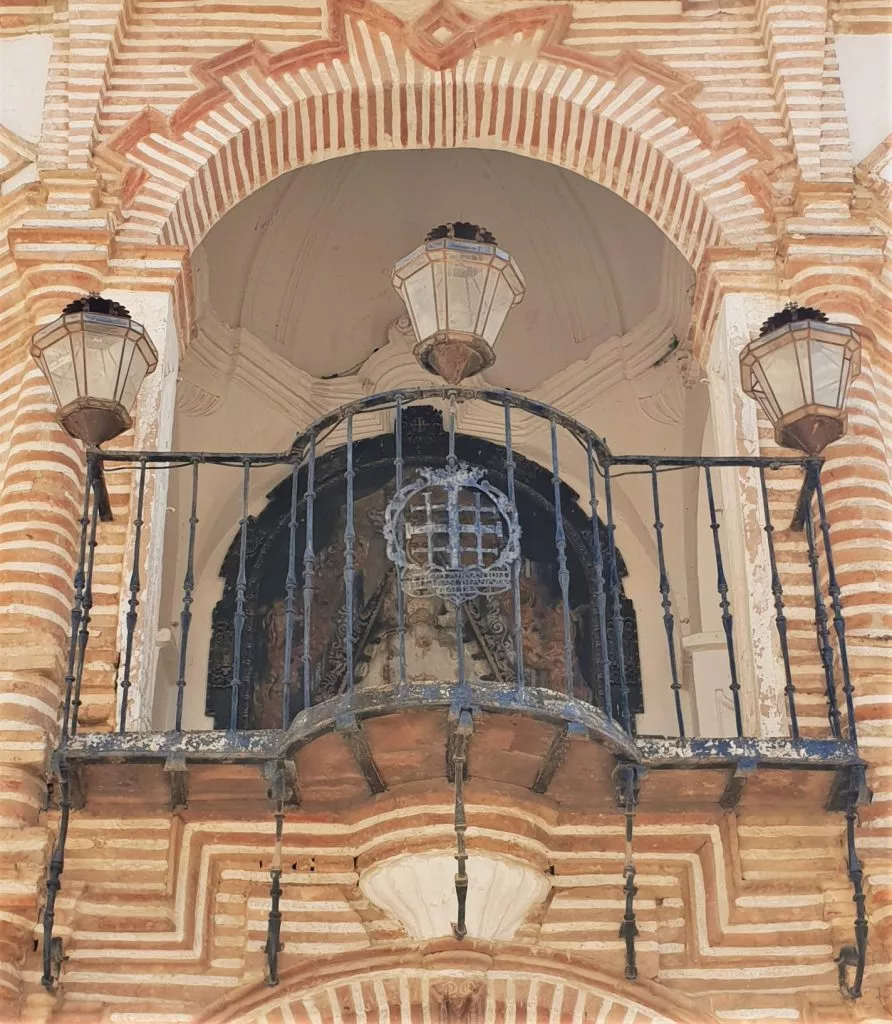
This authentic and picturesque town square is the perfect place to stop for lunch or a drink. Here is a nice place to enjoy some tapas : Bar La Socorilla
Santo Domingo Church
Its ceiling is known for its Mudejar style.
The statue of lovers
This statue refers to the Peña de los enamorados and its legend. It is located near La Puerta de Estepa.
Although the story of Romeo and Juliet is better known, the story of the lovers of the Peña de los enamorados is earlier. In fact, Christopher Columbus mentions in his diary, during a voyage to the Americas, that he found a rock “similar to that of the Enamorados de Antequera”.
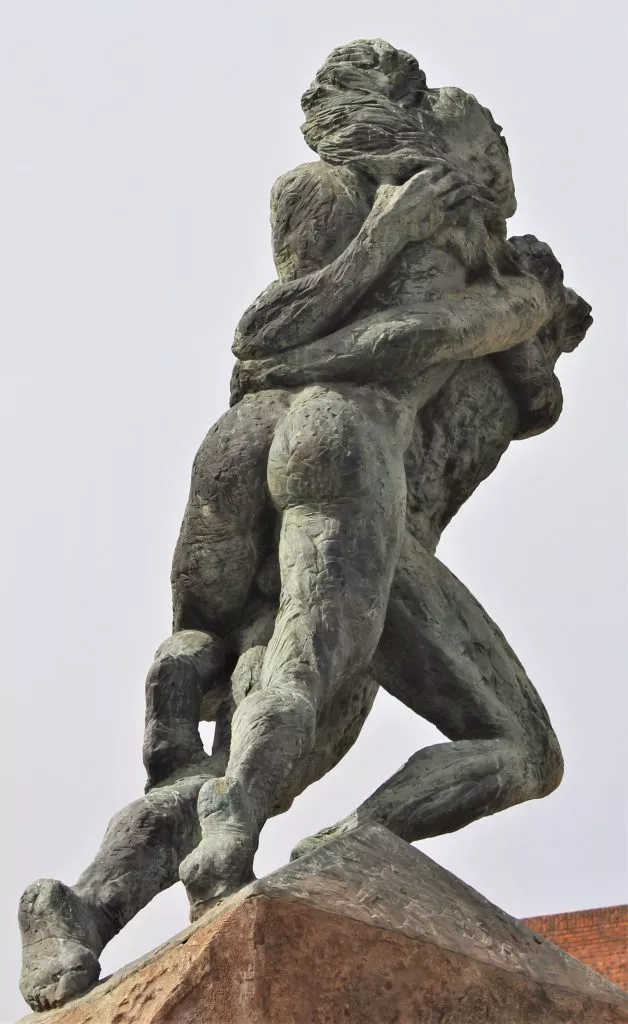
The artist who created this masterpiece, lovers ready to throw themselves into the void, is Manuel Patricio Toro.
The Palace of Nájera, an 18th century building and municipal museum
In this museum you can see a magnificent bronze sculpture from the Roman period (1st to 5th century AD).
This is the statue of the Ephebe. A marvel that was finally discovered a short time ago, in 1955.
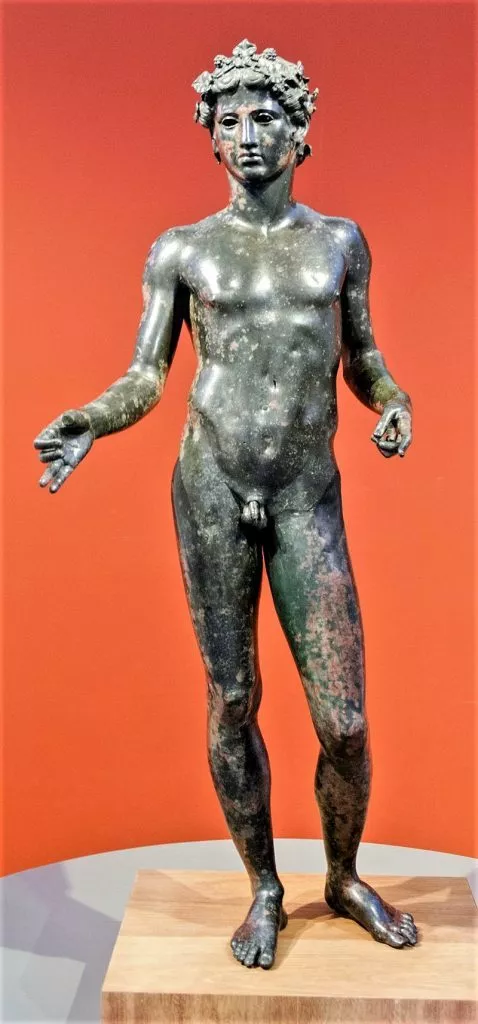
The Bullring Place
The bullring dates from 1848, and was rebuilt in 1984 in a style that reflects the architectural diversity of the city.
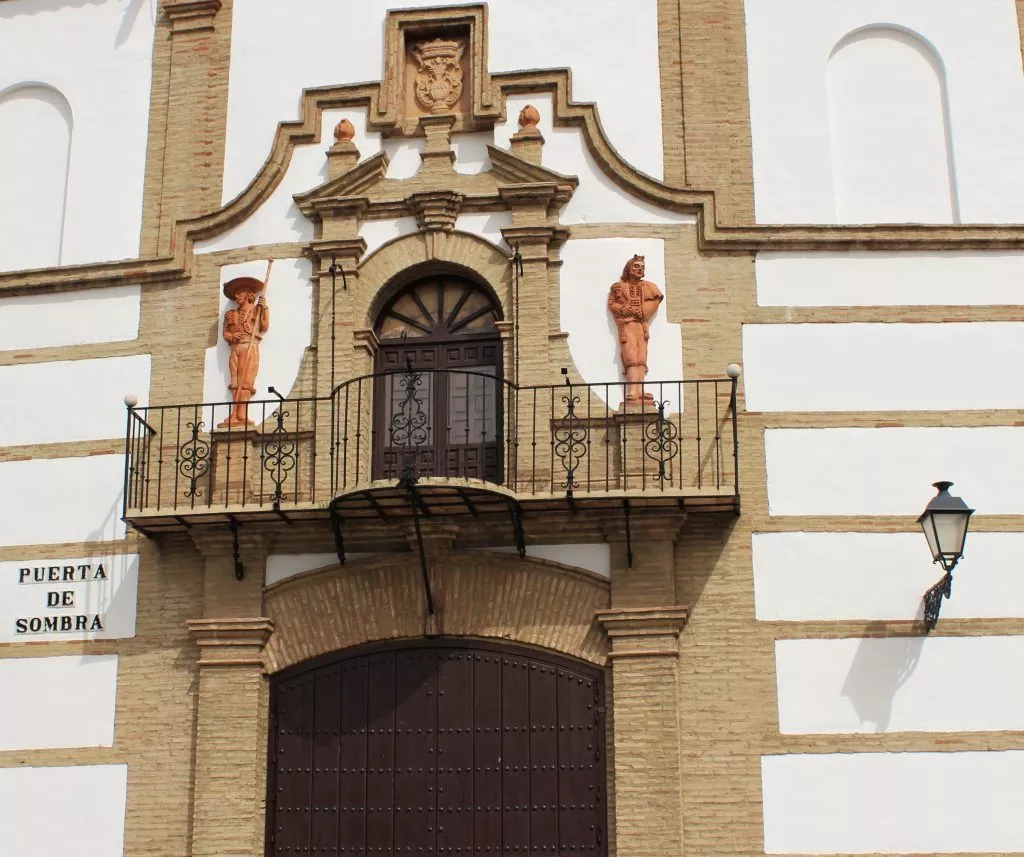
Arco de los Gigantes – the Arch of the Giants –
This wall was built in 1595 in honour of King Philip II of Spain. It was built on ancient Roman foundations of which traces can be seen.
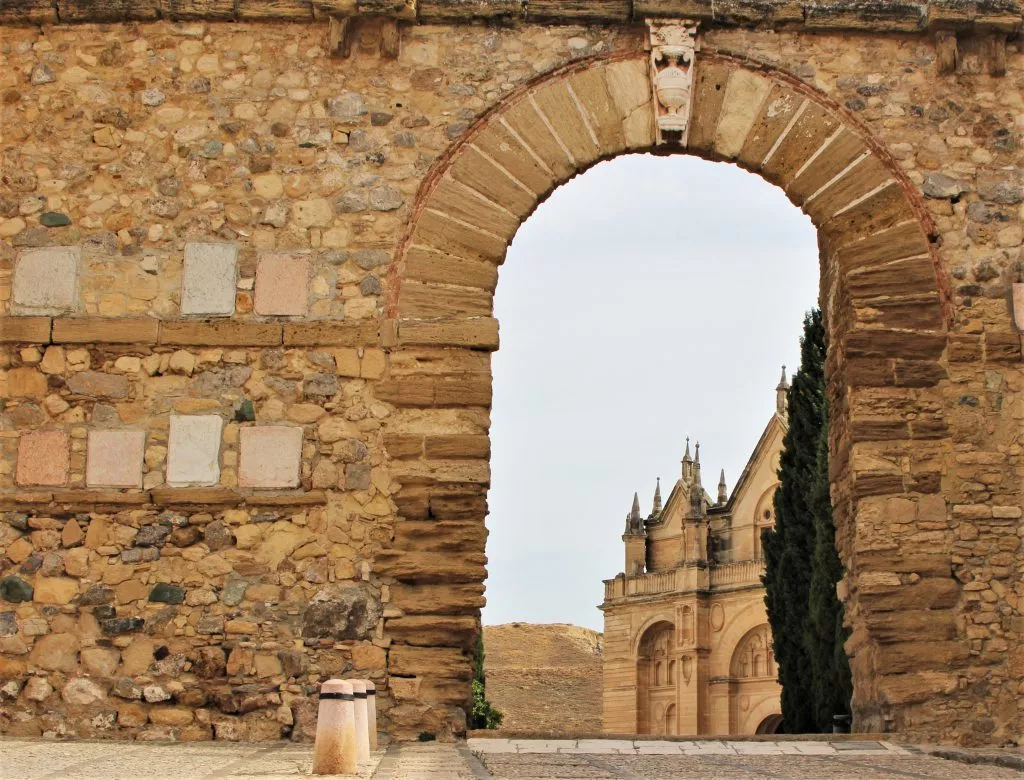
This Renaissance-style wall and arch was later decorated with Roman statues and tombstones, which were found on site or in the vicinity of the town!
On the cornice of the arch you can see the jar of lilies, the castle and the lion… which form the coat of arms of the town.
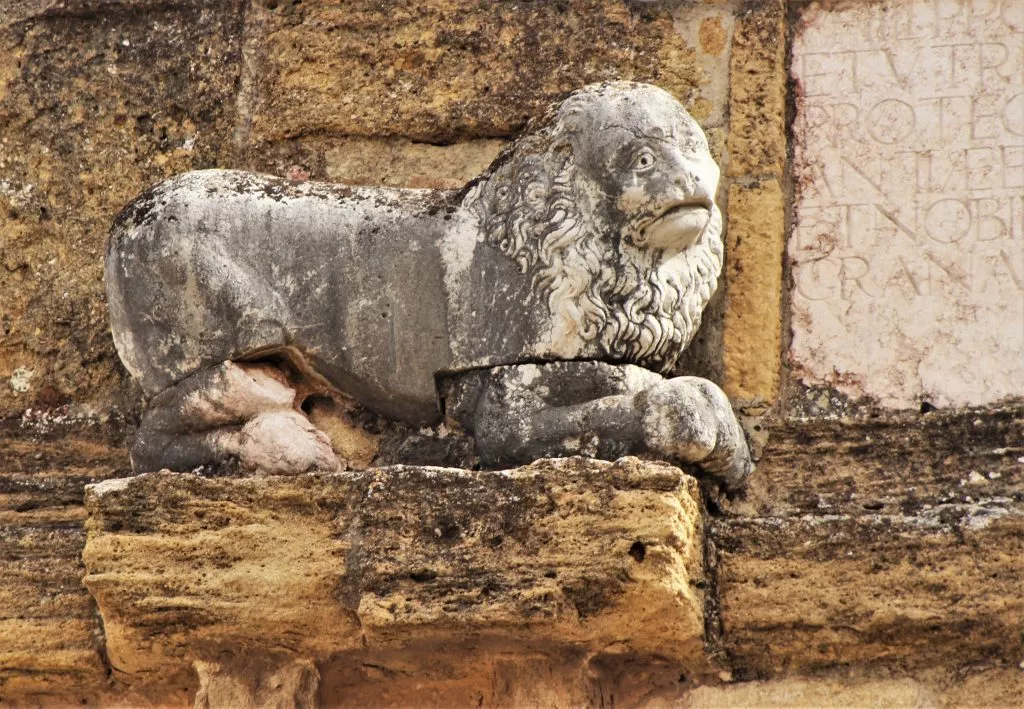
The Arch of the Giants offers a very beautiful perspective and view over the Royal Collegiate Church of Santa María la Mayor.
Los Remedios Church and its legend
It is located in the main street, in Calle Estepa. In this church is buried the Beata María Alonso. A legend says that if you ask her a question and tap her coffin three times, she will answer you. You will hear one tap for “yes” and two taps for “no”.
Roman Baths of Santa Maria
The old Roman baths are located right next to the Alcazaba.
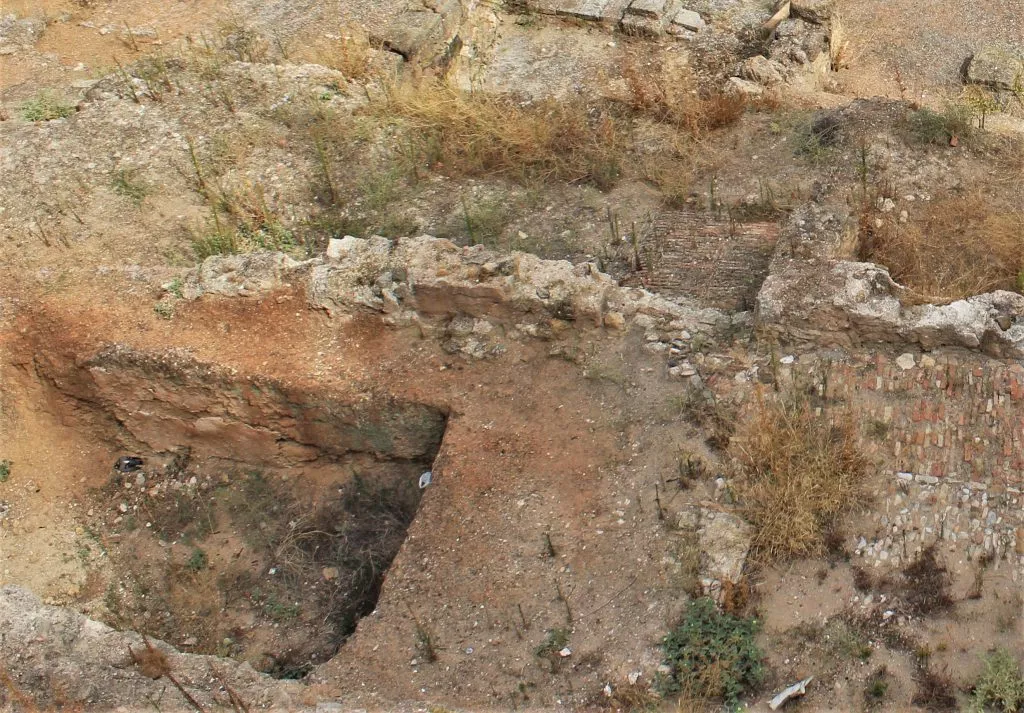
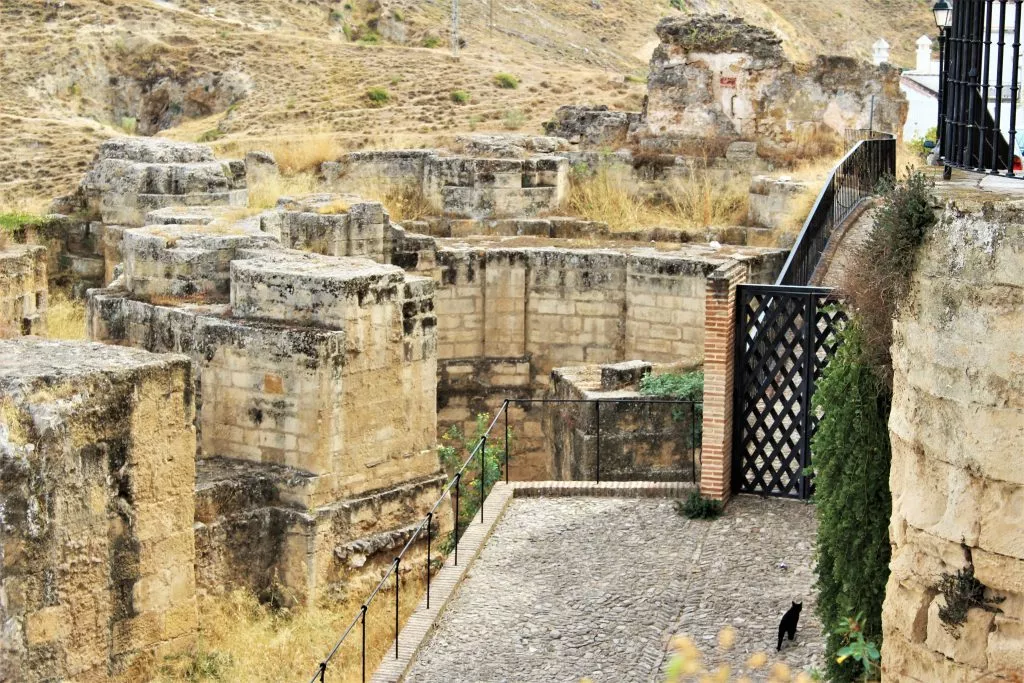
Palace of Los Marqueses de la Peña de los Enamorados
The palace can be seen in the foreground of the photo, with the Peña de los Enamorados behind it :
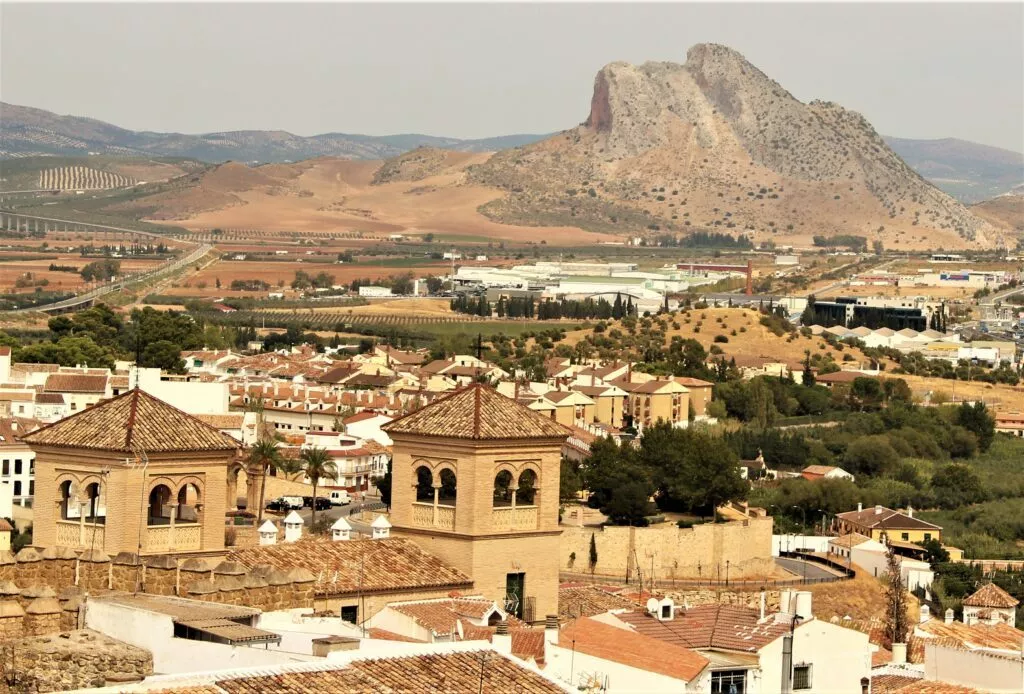
Here are some other interesting places to visit in Antequera:
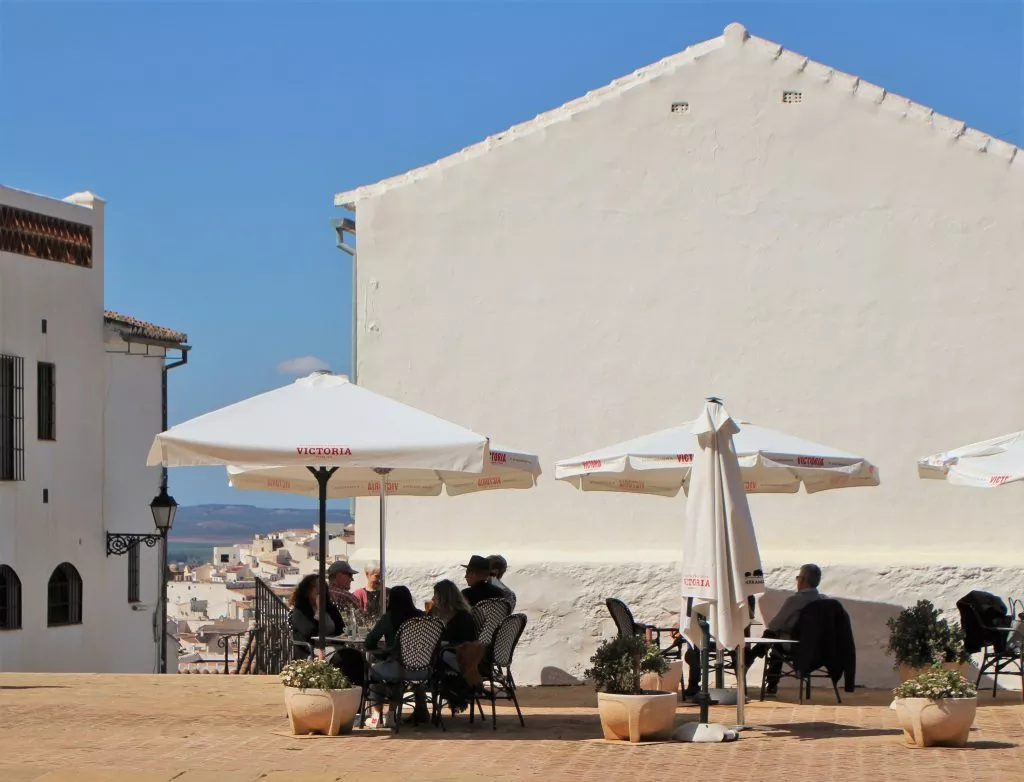
- Churches of Nuestra Señora de Loreto and San Juan de Dios (baroque art)
- the hospital of San Juan de Dios,
- the Pósito
- Consistorial Palace in a former convent.
- La Marquesa de las Escalonías Palace
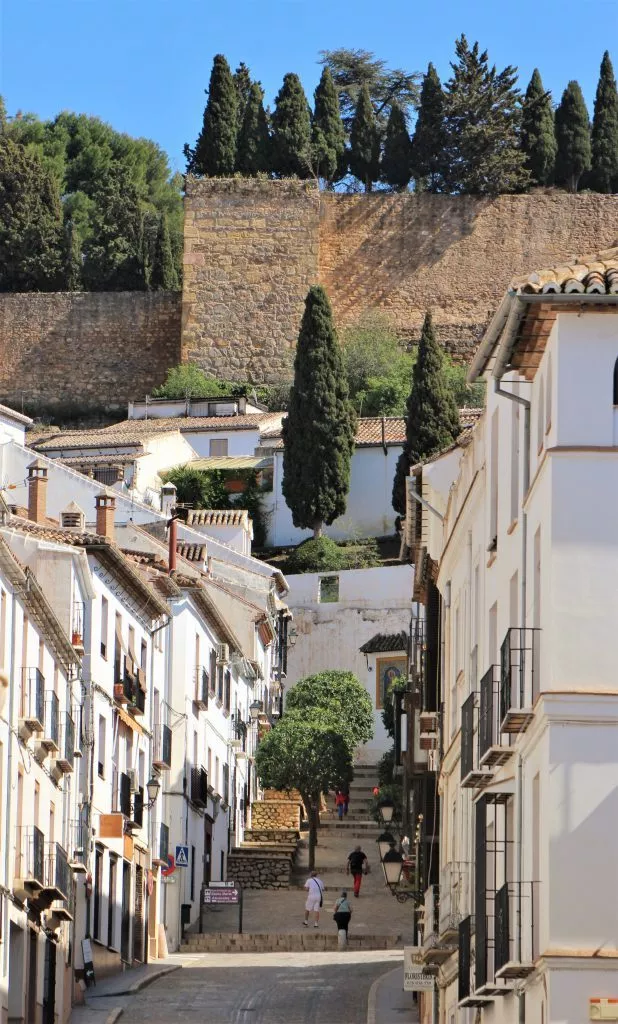
The Spring Fair in Antequera
Antequera is a really beautiful town to live in with about ten fiestas and ferias every year. The most important one is undoubtedly the Real Feria de Agosto (which dates back to 1748!) and one of the most beautiful is the Antequera Spring Fair!
Here is the poster of the Feria de la Primavera 2024 in Antequera :

Things to do in Antequera
Below are a number of ideas for activities and visits, categorised by theme. You can book them online today.
Bonus: all activities can be cancelled up to 24 hours before the scheduled date:
Guided and private visit of Antequera with an English-speaking guide
The English-speaking guide, Justine, in Antequera offers a private tour. She organises the Antequera Dolmens and El Torcal Natural Park Tour.
In the following link you will find all the information and the possibility to book: guided tour in English of Dolmens and El Torcal. She offers it from Antequera and from Malaga.
Where to stay in Antequera?
The location of Antequera
What to visit around Antequera?
For nature lovers, there are two splendid sites not to be missed just outside Antequera. The first is 20 km away and the second only 10 km:

Link to The Fuente de Piedra lagoon and its pink flamingo colony
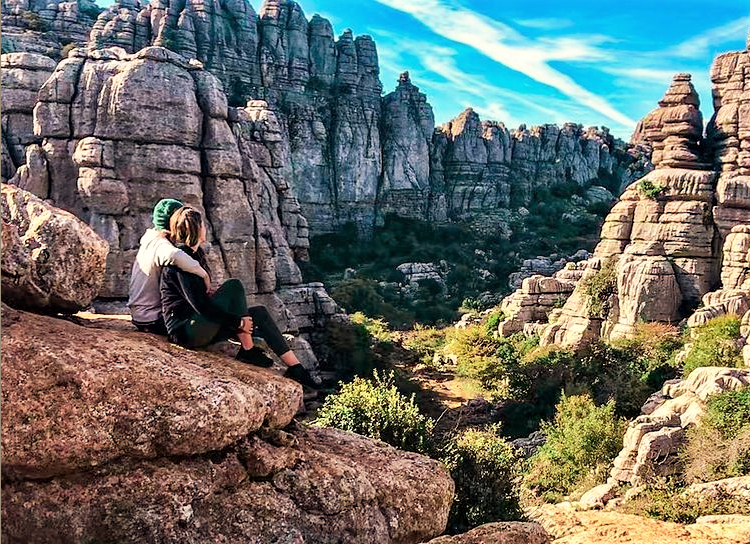
Link to El Torcal Natural Park, the Peña de los Enamorados and Dolmens.
Some useful links (car hire, other ideas for visits)
Easy and economical bookings
If you are in Andalucia as part of a tour with several major cities to visit, here are some links that may be of interest:
Seville
Seville, the capital of Andalucia, is a city full of treasures to discover and monuments to visit.
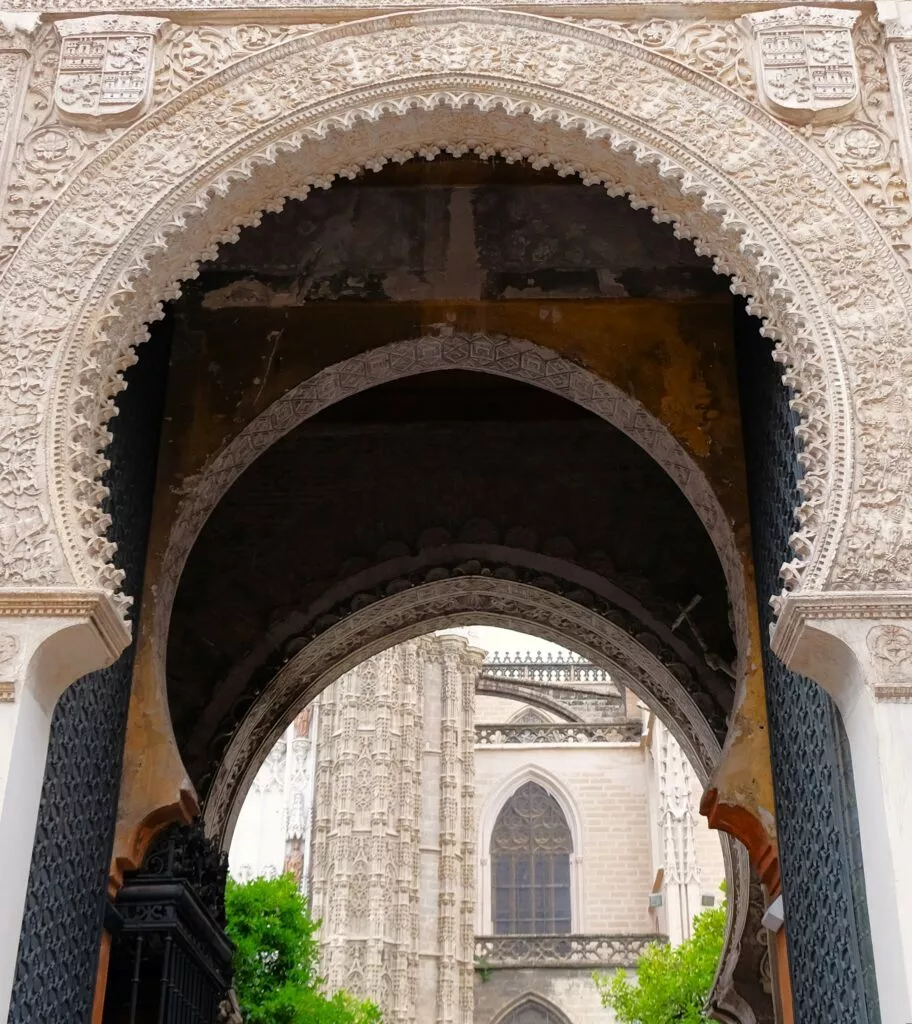
Here you will find everything you can see in Seville in 3 days. And for those who will stay longer you will also find information on secret Seville and the Santa Cruz and Triana districts.
Cadiz
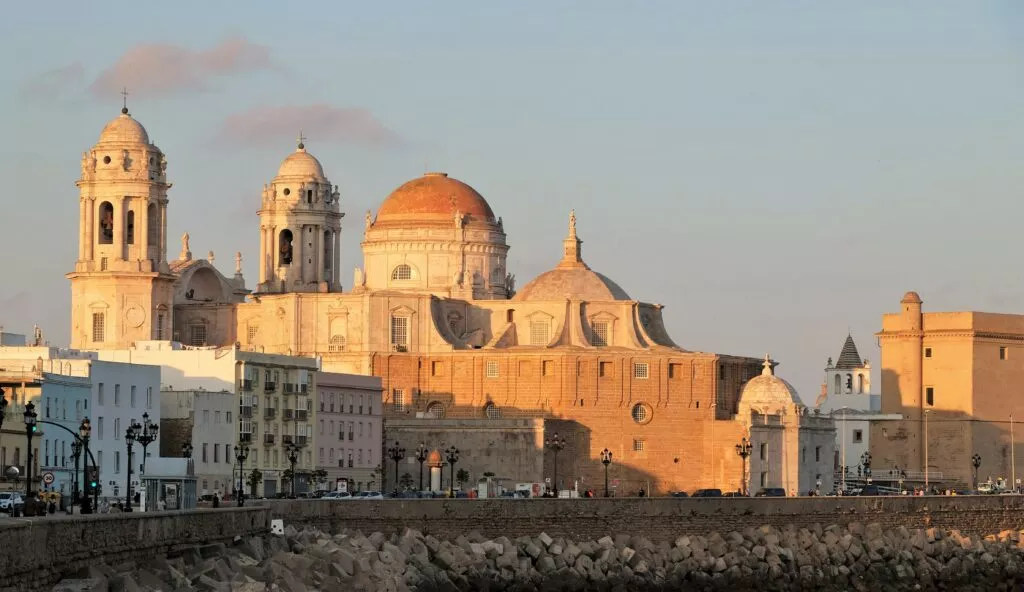
Visit Cadiz, a city with an incredible past and great beauty, on the Costa del la Luz.
Malaga
When you reach the Costa del Sol you will find in this link all must-sees in Malaga :

Granada
Discover what to see in Granada, and visit the Albaicin and Sacromonte districts:
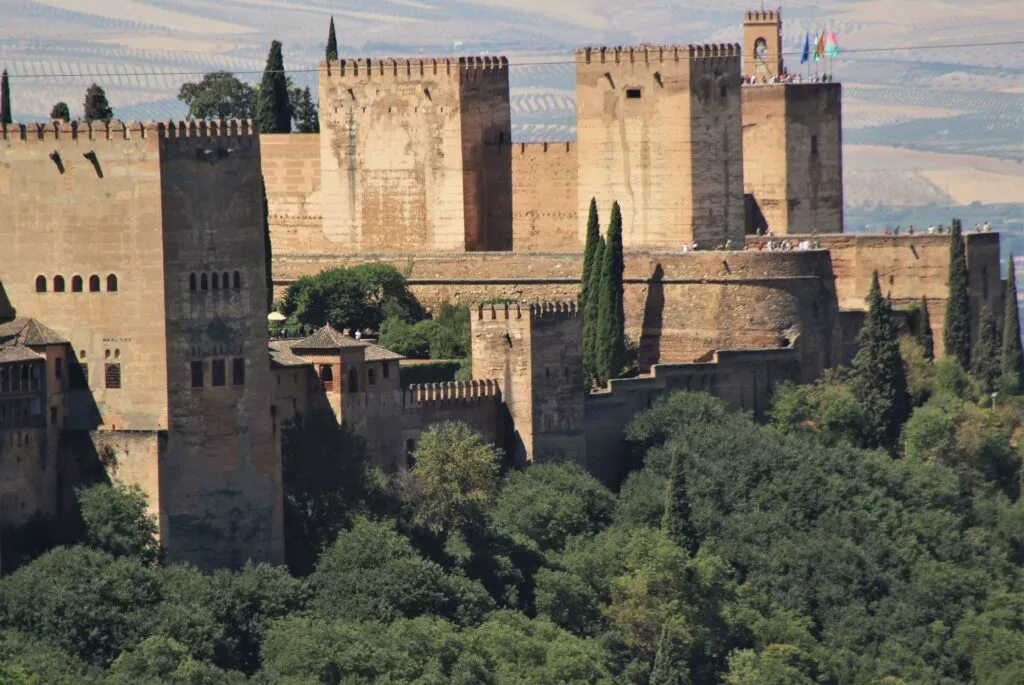
Cordoba
And of course, visit Cordoba, the caliphate city, and the Juderia district
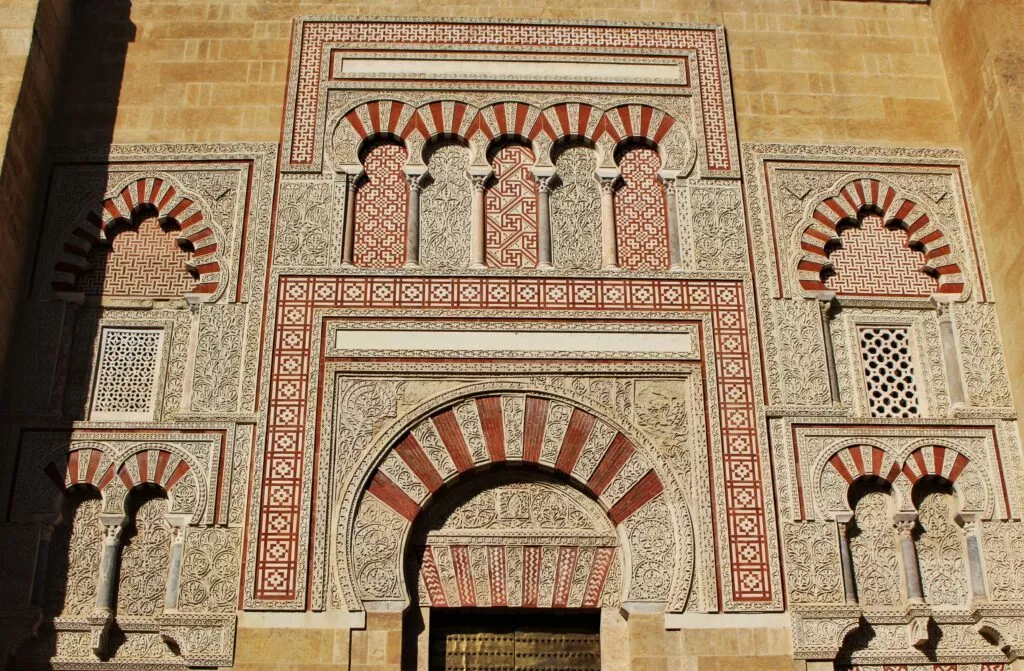
Everything you need to know about the Sacromonte and Albaicin districts before visit Granada
Discover other beautiful places in Andalusia in the pages of Andalusian blog
Here is the link to receive our newsletter from the andaluciamia.com blog
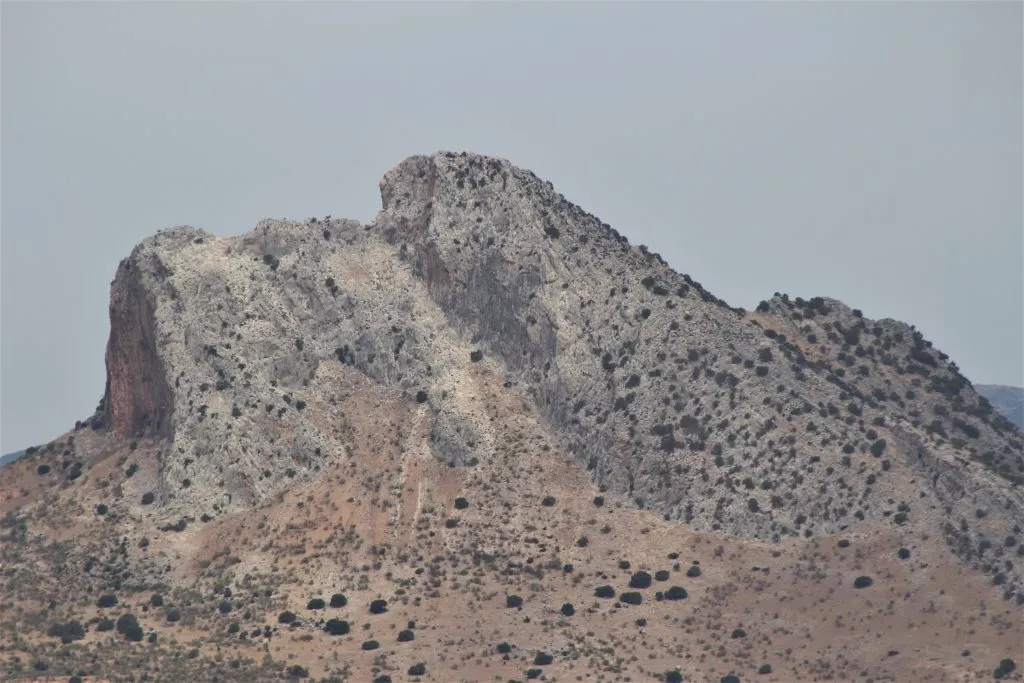
The latest articles on Andalucia
-
Interactive map of Andalucia with best places to see
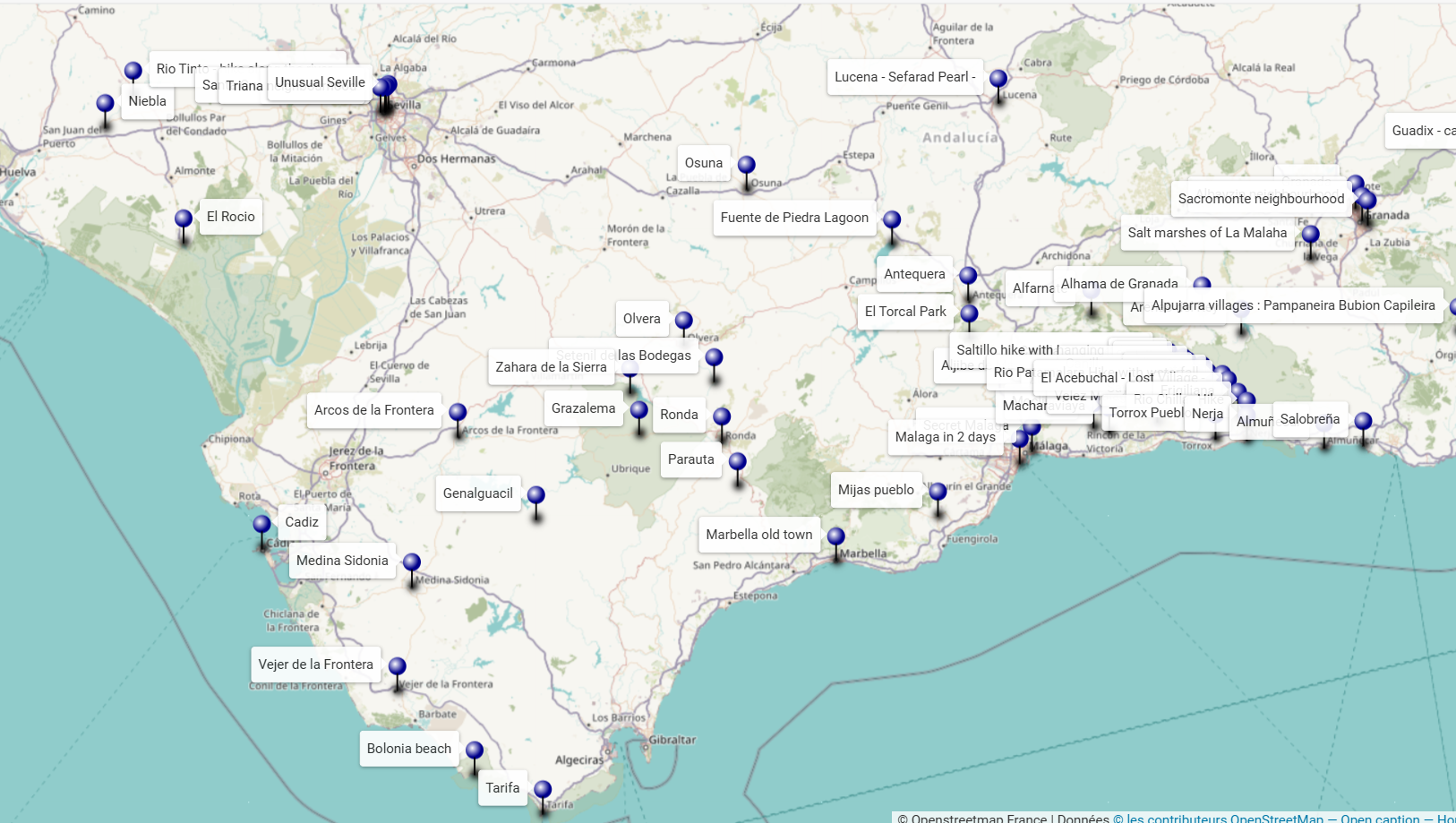
An interactive map of Andalucia to discover the sites to see around your holiday destination or to prepare a tour or road-trip.
-
Top 15 Must-See Attractions in Ubeda, Spain
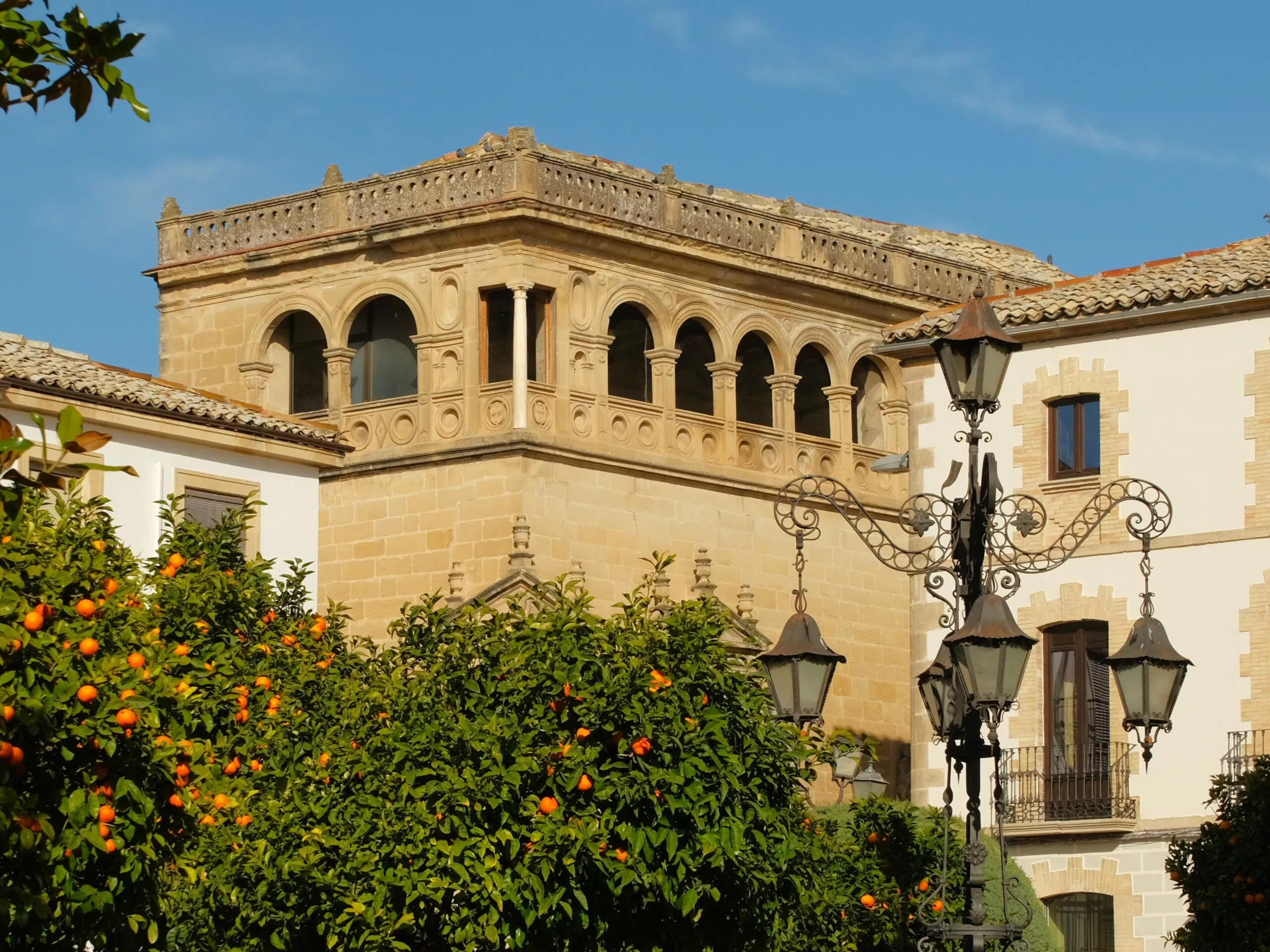
Here are the best places to visit and what to see in Ubeda. This Renaissance-style capital city of Andalusia is a marvel.
-
Visit Olula del Rio, the Mujer de Almanzora and the museum
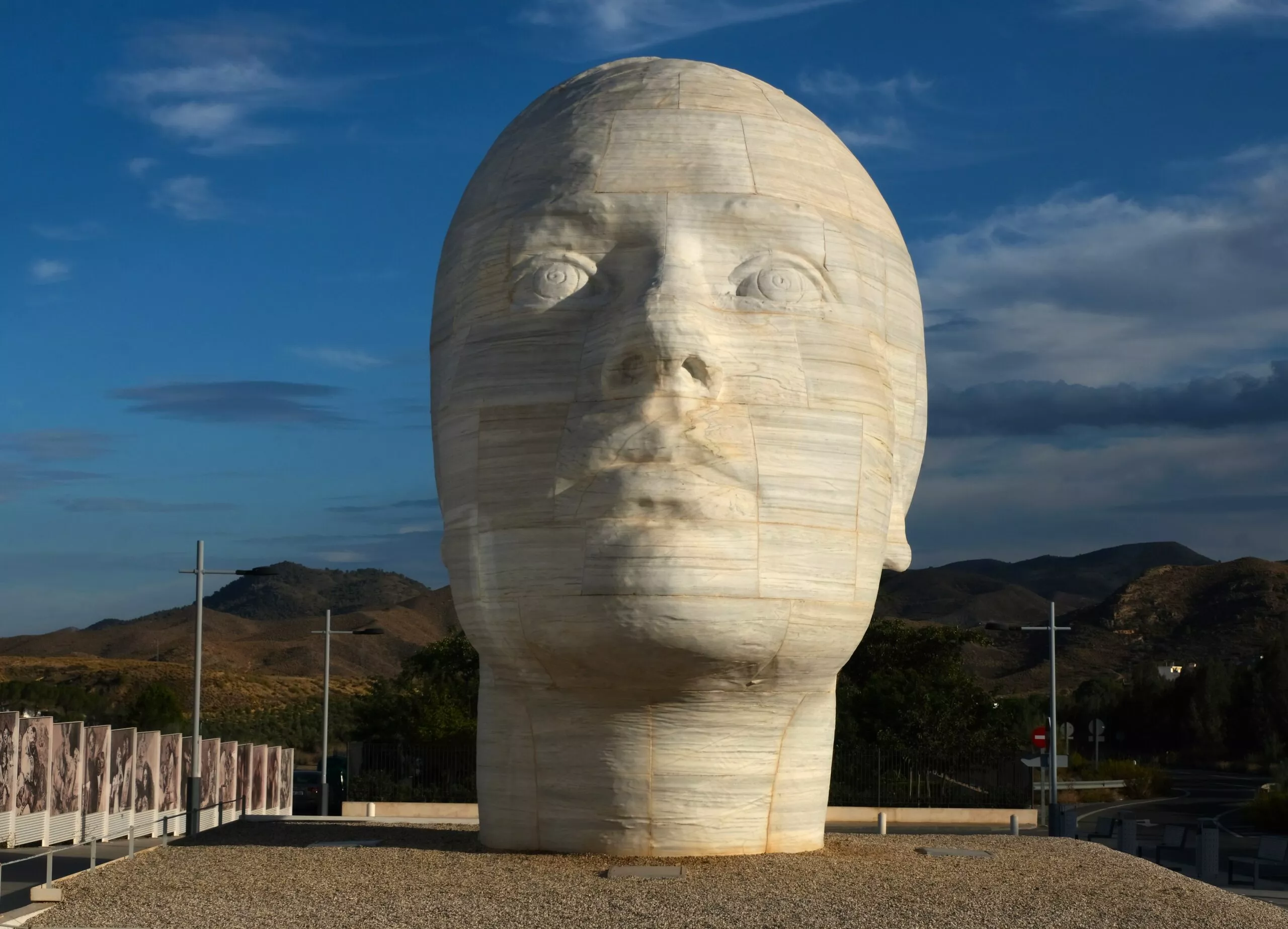
Olula del Rio see its 3 wonders: an extraordinary marble sculpture, a surprising museum and an incredible photography centre.
-
Fiesta del Queso in Zuheros Cordoba

Discover the incredible Cheese Festival – Fiesta del Queso in Zuheros, one of the most beautiful white villages in Spain.
